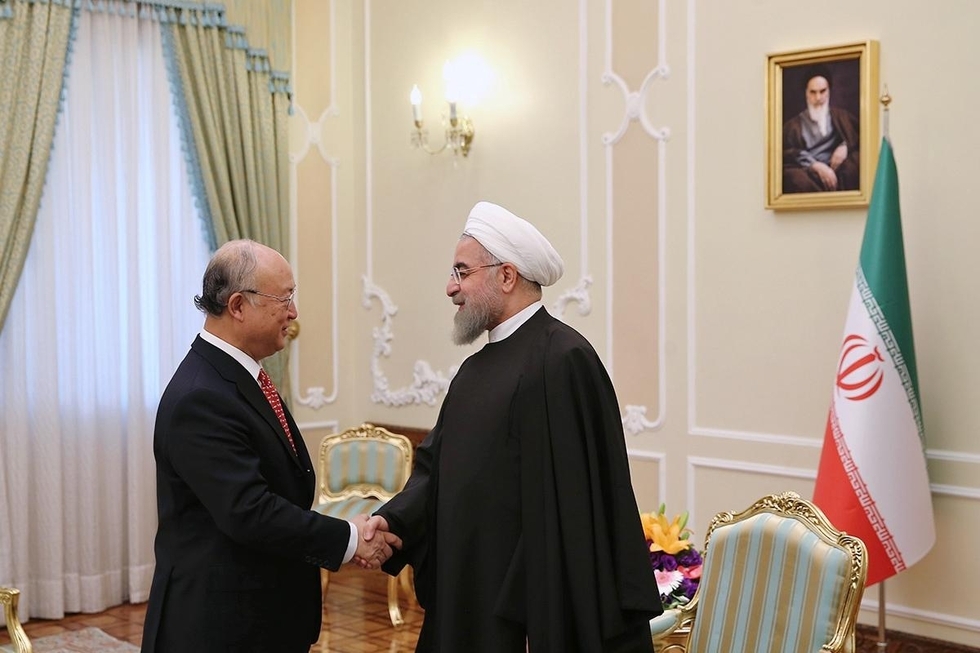IAEA chief visits Iran's controversial Parchin site

The head of the UN atomic watchdog was granted access on Sunday to a controversial Iranian military site where it is alleged covert research to build a nuclear bomb took place.
Yukiya Amano, chief of the International Atomic Energy Agency (IAEA), visited Parchin, a base east of Tehran, as efforts are stepped up to resolve "ambiguities" with Iran about past "possible military dimensions" of its nuclear programme by the end of the year.
Iran has said the accusations from Western intelligence agencies - including that the Islamic republic carried out explosives tests at Parchin - are groundless and based on malicious information provided by its enemies.
"Amano paid a formal visit to Parchin, and visited some workshops about which there has been some false information," said Behrouz Kamalvand, a spokesman for Iran's Atomic Energy Organisation.
The Vienna-based IAEA confirmed the site visit, which is significant given that previous requests for access had been refused.
It comes as Iran and six world powers aim to implement a deal sealed in July aimed at ending a 13-year standoff over Tehran's nuclear activities.
A 15 December deadline looms for completion of the IAEA's long-running inquiry into allegations that at least until 2003, Iran conducted research into how to develop an atomic bomb.
The IAEA said recently that satellite imagery had shown the presence of vehicles, equipment and probable construction materials at the Parchin site, which US media reported as being suspicious and possible evidence of efforts to disguise past illicit activity.
Iran, however, dismissed the reports and said the work related to reconstruction of a road that had been damaged by flooding.
Unresolved concerns
Amano earlier on Sunday held talks with top Iranian officials about unresolved concerns over Iran's nuclear programme.
He also met Foreign Minister Mohammad Javad Zarif and President Hassan Rouhani as well as atomic agency chief Ali Akbar Salehi.
Under the recent nuclear deal, Iran - in exchange for an eventual lifting of international sanctions - agreed to curb its nuclear activities that experts say would make any dash to produce a weapon all but impossible.
Amano also on Sunday addressed a 12-member committee set up by the Iranian parliament to examine the deal, but the meeting was held behind closed doors.
Rouhani was quoted by the official IRNA news agency as telling Amano that Iran would implement the deal, known as the Joint Comprehensive Plan of Action, and "we hope that you will fairly supervise the accord's implementation".
"We do not seek any demand beyond the safeguards agreement between Iran and the agency," Rouhani added, referring to IAEA verification measures, arguing that the "legitimacy of Iran's peaceful nuclear activities had been proven under past supervision".
He also said Iran was committed to voluntary implementation of an additional protocol under which the IAEA is granted access and information about states' nuclear sites.
As of June 2015, additional protocols were in force with 126 countries and another 20 are signatories but have yet to bring it into force, according to the IAEA.
'A positive view'
Ahead of Amano's visit, the IAEA said the discussions in Tehran would "focus on... clarification of past and present outstanding issues regarding Iran's nuclear programme".
On 9 September, the UN agency said Iran must resolve ambiguities over its past nuclear activities before UN and Western sanctions can be lifted.
The IAEA will also have the task of confirming that Iran has scaled down its nuclear activities in accordance with the deal struck with Britain, China, France, Russia and the US plus Germany.
Iranian lawmakers are in the final stages of reviewing the text of the nuclear agreement. It is not clear if there will be a parliamentary vote.
Rouhani, meanwhile, told US media that most Iranians "have a positive view" of the nuclear deal, and that it would likely be ratified.
"Institutions like the parliament and the Supreme National Security Council, are usually not far removed from public opinion and move in that direction," he told CBS show "60 Minutes" broadcast Sunday.
This month in the US, the Republican-led House of Representatives rejected the nuclear deal in a symbolic vote held a day after the Senate cleared the way for the accord to come into force.
New MEE newsletter: Jerusalem Dispatch
Sign up to get the latest insights and analysis on Israel-Palestine, alongside Turkey Unpacked and other MEE newsletters
Middle East Eye delivers independent and unrivalled coverage and analysis of the Middle East, North Africa and beyond. To learn more about republishing this content and the associated fees, please fill out this form. More about MEE can be found here.

